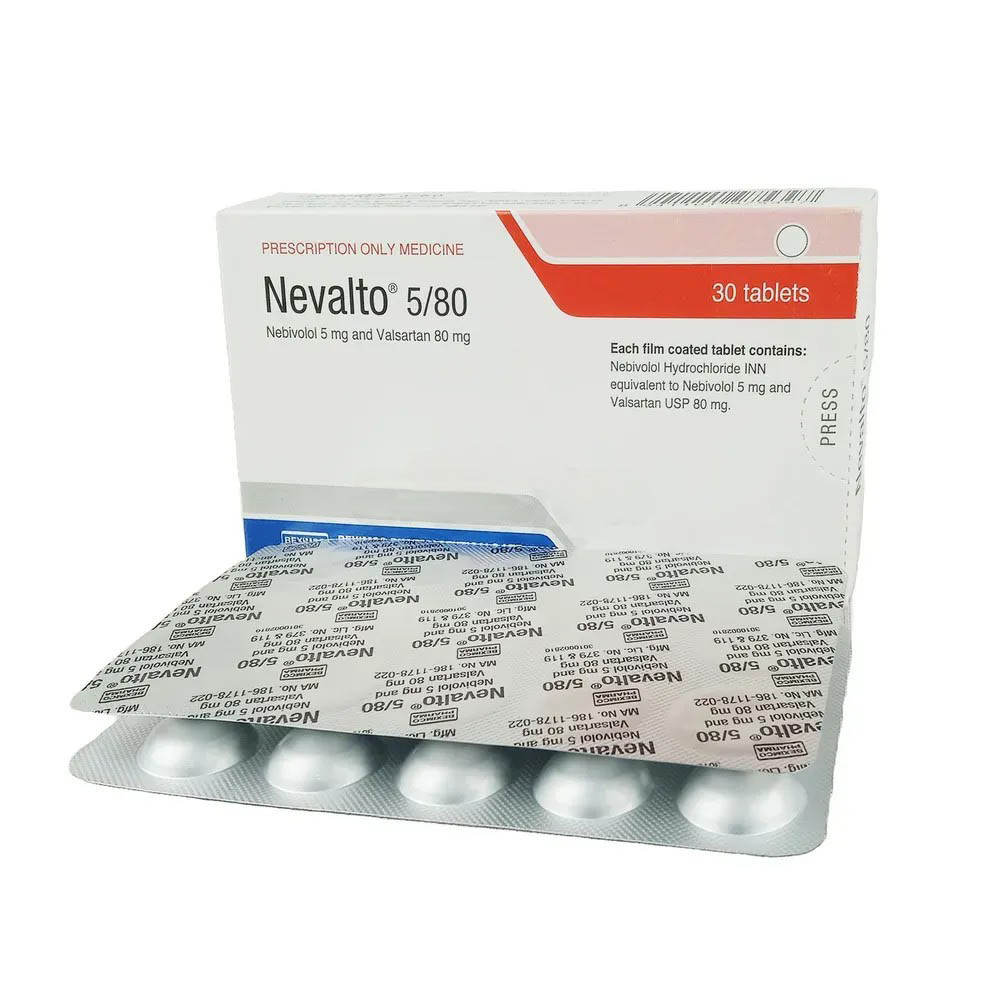Unit Price:
৳ 15.00
(2 x 15: ৳ 450.00)
Strip Price:
৳ 225.00
Indications
This is a combination product containing beta adrenergic blocker and an angiotensin II receptor blocker (ARB) indicated for the treatment of hypertension, to lower blood pressure. Lowering blood pressure reduces the risk of fatal and nonfatal cardiovascular events, primarily strokes and myocardial infarctions.
* রেজিস্টার্ড চিকিৎসকের পরামর্শ মোতাবেক ঔষধ সেবন করুন
Pharmacology
Nebivolol is a cardiovascular drug belonging to the group of selective beta-blocking agents (i.e. with a selective action on the cardiovascular system). It prevents increased heart rate and controls heart pumping strength. It also widens blood vessels which helps to lower blood pressure. Valsartan blocks the action of angiotensin II receptor by acting on AT1 subtype, dilates blood vessels and reduces blood pressure without affecting pulse rate.
Dosage & Administration
As initial therapy and in patients not adequately controlled on valsartan 80 mg or nebivolol up to and including 10 mg, the recommended dose of 5 mg/80 mg (nebivolol/valsartan) is one tablet, taken orally once daily. Maximum antihypertensive effects are attained within 2 to 4 weeks. Increasing the dose of nebivolol/valsartan 5/80 does not result in any meaningful further blood pressure reduction. 5/80 may be substituted for its components in patients already receiving 5 mg nebivolol and 80 mg valsartan.
* রেজিস্টার্ড চিকিৎসকের পরামর্শ মোতাবেক ঔষধ সেবন করুন
Interaction
CYP2D6 enzyme inhibitors increase nebivolol levels & Reserpine or clonidine may produce excessive reduction of sympathetic activity.
Digitalis glycosides increase the risk of bradycardi & Verapamil-or diltiazem-type calcium channel blockers may cause excessive reductions in heart rate, blood pressure, and cardiac contractility. Potassium sparing diuretics, potassium supplements or salt substitutes may lead to increases in serum potassium besides that, NSAID use may lead to increased risk of renal impairment and loss of antihypertensive effect.
Dual inhibition of the renin-angiotensin system: Increased risk of renal impairment, hypotension, and hyperkalemia.
Digitalis glycosides increase the risk of bradycardi & Verapamil-or diltiazem-type calcium channel blockers may cause excessive reductions in heart rate, blood pressure, and cardiac contractility. Potassium sparing diuretics, potassium supplements or salt substitutes may lead to increases in serum potassium besides that, NSAID use may lead to increased risk of renal impairment and loss of antihypertensive effect.
Dual inhibition of the renin-angiotensin system: Increased risk of renal impairment, hypotension, and hyperkalemia.
Contraindications
This is contraindicated in the following conditions:
- Severe bradycardia
- Heart block greater than first degree
- Patients with cardiogenic shock
- Decompensated cardiac failure
- Sick sinus syndrome (unless a permanent pacemaker is in place)
- Patients with severe hepatic impairment (Child-Pugh >B)
- Patients who are hypersensitive to any component of this product
- Do not co-administer aliskiren with 5/80 in patients with diabetes
Side Effects
- Hypotension
- Hyperkalemia
Pregnancy & Lactation
This can cause fetal harm when administered to a pregnant woman. Not recommended during pregnancy. Advise not to breastfeed.
Precautions & Warnings
- Acute exacerbation of coronary artery disease upon cessation of therapy: Do not abruptly discontinue.
- Diabetes: Monitor glucose as -blockers may mask symptoms of hypoglycemia.
- In susceptible patients: Need to monitor renal function and potassium level.
Use in Special Populations
Pediatric Use: Safety and effectiveness in pediatric patients have not been established.
Geriatric Use: No overall differences in safety or effectiveness were observed between elderly patients and younger patients, and other reported clinical experience have not identified differences in responses.
Renal Impairment: This is not recommended as initial treatment in patients with severe renal impairment, because the recommended starting dose of nebivolol in this population, 2.5 mg once daily.
Hepatic Impairment: There are no studies of Nebivolol/Valsartan in patients with hepatic insufficiency.
Geriatric Use: No overall differences in safety or effectiveness were observed between elderly patients and younger patients, and other reported clinical experience have not identified differences in responses.
Renal Impairment: This is not recommended as initial treatment in patients with severe renal impairment, because the recommended starting dose of nebivolol in this population, 2.5 mg once daily.
Hepatic Impairment: There are no studies of Nebivolol/Valsartan in patients with hepatic insufficiency.
Overdose Effects
Nebivolol: If overdose occurs, provide general supportive and specific symptomatic treatment.
- Bradycardia: Administer IV atropine.
- Hypotension: Administer IV fluids and vasopressors. Intravenous glucagon may be useful.
- Heart Block (second or third degree): Monitor and treat with isoproterenol infusion. Under some circumstances, transthoracic or transvenous pacemaker placement may be necessary.
- Congestive Heart Failure: Initiate therapy with digitalis glycoside and diuretics.In certain cases, consider the use of inotropic and vasodilating agents.
- Bronchospasm: Administer bronchodilator therapy such as a short acting inhaled 2-agonist and/or aminophylline.
- Hypoglycemia: Administer IV glucose.Repeated doses of IV glucose or possibly glucagon may be required.
- Supportive measures should continue until clinical stability is achieved. The half-life of low doses of nebivolol is 12-19 hours.
Therapeutic Class
Combined antihypertensive preparations
Storage Conditions
Do not store above 30°C. Keep in a dry place. Protect from light and keep out of the reach of children.

